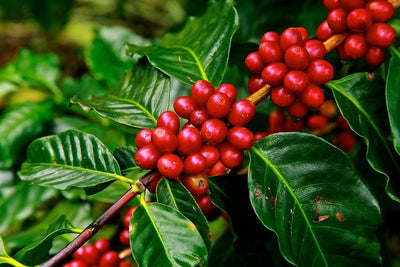Coffee beans, sadly, aren’t a very sustainable crop—at least not yet. They’re sold at rock-bottom prices on the commodity market, the plants are sometimes doused in chemicals, and many farms destroy wildlife habitats for the sake of more coffee trees.
This is why coffee certifications are so important…
- They offer guidance to farms that want to be more sustainable
- They give farmers a chance to sell their crop at a higher price
- They help you buy beans that are sustainably grown and purchased
But sometimes these certifications aren’t very well explained, which leads us to not really know what they mean at all. We’d like to change that.
In this quick guide, I’ll break down the five most common coffee bean certifications, how they work, and what they really mean for you. By the end, you’ll be able to explain the differences to friends and family, which means you’ll get to play a small part in making coffee more sustainable.
Read: An Overview Of Coffee And Health
Fair Trade Coffee
Everyone’s heard of Fair Trade coffee. It’s one of the biggest agricultural certifications out there, touching everything from coffee to sugar to cotton.
- Primary Goal: Alleviate poverty by empowering farmers to pay better wages to workers in exchange for a certification that allows those farmers to charge more for their crops.
The idea is to establish strict standards for worker wages, business ethics, and environmental friendliness that coffee buyers will pay a premium for. So while a bag of Fair Trade beans may cost $2 more than a non-Fair Trade bag, that extra money (actually, a small percentage of it) is what’s incentivizing farmers to have a more economically sustainable business.
This system helps build up communities by ultimately bringing in more money to areas that could use it. It’s made a difference in the lives of millions around the world already—so we’re pretty big fans of this certification.
Read: Fair Trade VS Direct Trade Coffee: Which Is Better For Coffee Sustainability?
However, it’s important to know that the Fair Trade certification has nothing to do with coffee quality.
There’s plenty of Fair Trade specialty coffee, but most of it is actually still commodity-grade coffee, which means those farms still aren’t making great money—but it’s certainly better than nothing.
Certified Organic Coffee
Organic coffee’s another big one—and when I say big, I mean crazy big. As the most heavily regulated food certification in the United States, you can count on organic coffee being an excellent buy if you’re trying to maximize sustainability.
Here’s the thing: organic coffee isn’t really any better for you than non-organic coffee. However, it’s a lot better for people living on or near coffee farms.
That’s right—the biggest health benefits of organic coffee go to the actual farmers and farm laborers!
Agro-chemicals end up in the water supply of farms around the world, which can be traced to some illnesses in farming communities. Though these chemicals are almost non-existent by the time the coffee beans reach your home, they’re a big deal for these farming areas.
Read: Searching For Certified Organic Coffee - Is It Worth It?
But it’s not only these communities that benefit—the environment does too!
Organic farming helps improve biodiversity, keeps habitats from being destroyed, and promotes good soil health. It does take more space to grow organic coffee—so it’s not something that every farm in the world can afford—but it’s definitely a good thing for many farms.

UTZ Certified Coffee
This certification doesn’t actually exist anymore (it merged with the Rainforest Alliance at the end of 2017), but it’s still one you may find companies talk about online, so I’ll go ahead and briefly cover it.
- Primary Goal: Improve supply chain transparency, farming management practices (including worker wages), and environmentally sustainable techniques so that farmers can charge a premium for their crops.
This certification was process-focused, which means farms could earn the certification while they’re in the process of meeting criterion (most other organizations require you to satisfy all the standards before awarding a farm with a certification).
Read: A Glossary Of Coffee Growing And Processing Terms
Generally, farms were able to charge between 5 and 15 cents more per pound with this certification than they were able to with normal commodity market coffee.
Rainforest Alliance Coffee
This certification you’ll still find on coffee bags, even though it merged with UTZ in 2017. Like the old UTZ, it’s a process-focused certification that awards farms that are currently taking steps toward the standards, even if they don’t yet meet all the criterion.
Since so many coffee farms are located in the midst of rainforests and cloud forests, we’ve seen a big decline in natural forests where coffee’s grown. This certification is heavily focused on preserving these natural forests by requiring farms to have native vegetation growing within the farming area.
If you’re wanting to reward farmers that are growing coffee within nature, rather than on top of it, this is a good one to keep an eye out for.
Read: 5 Ways To Make Your Coffee More Eco-Friendly
Bird Friendly Coffee
Like the Rainforest Alliance certification, the Bird Friendly initiative is aimed at making coffee farms a more friendly place for native birds, which often have their habitats destroyed when forests are cleared to make way for agricultural land.
Developed by the Smithsonian Migratory Bird Center, this is the only certification that’s a true “shade-grown” certification. The others on this list, including the Rainforest Alliance, don’t actually require shade trees—just native plants.
Additionally, to get this one, a farm must also be Certified Organic—and all the criterion must be met before the certification is awarded.
---
These coffee certifications give us a path towards rewarding farms that are mindful and working hard to make growing coffee more sustainable. We at JavaPresse encourage you to seek out these coffees—not exclusively (many non-certified farms are still sustainable), but as often as you can.
And, of course, if you’d like to have these kinds of sustainable coffees delivered right to your door, we’ve got the solution: our Coffee Club.
We source beans from some of the best and most sustainably-minded farms in the world (almost all of our beans have one of these certifications). We then roast them to highlight their best flavors and ship them to you within two hours—so you know you’re getting uber-fresh coffee!


